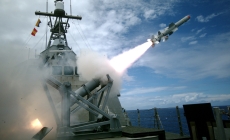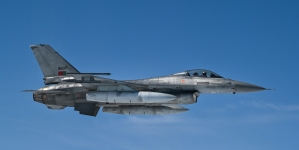-
China Sanctions Boeing Over Taiwan ‘Arms Sales’ - May 21, 2024
-
A portion of Mulholland Drive, damaged by mudslides in winter storms, reopens - May 26, 2024
-
‘Maybe You Don’t Want to Win’ - May 26, 2024
-
Donald Trump Putting Law Enforcement in Danger: Attorney - May 25, 2024
-
Avoid the waters of these 5 L.A. County beaches this holiday weekend, public health officials say - May 25, 2024
-
Bawdy Comedy ‘Anora’ Wins Palme d’Or at Cannes Film Festival - May 25, 2024
-
Map Shows Heat Wave Zone Spread Into Five New States - May 25, 2024
-
Azusa police arrest suspected slingshot-wielding vandal - May 25, 2024
-
Donald Trump Hammers Judge Ahead of Jury Instructions - May 25, 2024
-
Sometimes U.S. and U.K. Politics Seem in Lock Step. Not This Year. - May 25, 2024
China Sanctions Boeing Over Taiwan ‘Arms Sales’
China announced new sanctions on three major U.S. defense contractors, including aerospace giant Boeing, citing “arms sales to the Taiwan region.”
Boeing’s defense division, General Dynamics Land Systems, and General Atomics Aeronautical Systems, have been added to the Chinese commerce ministry’s “Unreliable Entities” list, according to a pair of ministry statements.
These companies are now prohibited from conducting trade or investment activities in China and their executives are subject to an entry ban. The companies join five other U.S. defense firms, including Lockheed Martin and Raytheon, which Beijing levied sanctions against in 2023.
The sanctions are largely symbolic, given U.S. laws prohibiting the sale of military technology to countries deemed adversarial, but come amid heightened tensions between the superpowers over Taiwan—the Beijing-claimed democratic island that Chinese President Xi Jinping has called an “uncrossable red line.”

Lt. Bryce Hadley/U.S. Navy
Taiwan foreign ministry spokesperson Jeff Liu pointed out that this was not the first time China has levied sanctions against American firms over arms sales to Taipei.
“The Ministry of Foreign Affairs deeply regrets it. Taiwan strives to maintain peace and stability across the Taiwan Strait,” he told Newsweek.
“In the face of China’s military threats and intimidation, our government has the responsibility to protect the security of the Taiwanese people,” Liu added.
Boeing and the Chinese Commerce Ministry did not immediately respond to written requests for comment.
He said his government would continue to urge Washington to meet its commitments under the Taiwan Relations Act and standing bilateral agreements.
Though the U.S., like most countries, no longer recognizes Taiwan officially, it maintains strong de facto diplomatic ties with the island and is obligated under the Taiwan Relations Act to contribute to its self-defense.
China has vowed to someday bring the island into the fold, through force if necessary, though Beijing’s Chinese Communist Party government has never ruled there.
China’s increasing military activity in the waters and airspace around Taiwan in recent years has led the island to boost defense spending and ramp up domestic weapons production.
Taiwan’s defense forces are waiting for a number of U.S. orders to be fulfilled, including Boeing’s $500 million contract for 100 shore-based Harpoon missile systems to bolster coastal defenses.
The latest sanctions by Beijing were announced the same day Taiwan inaugurated its new president, Lai Ching-te, whom China has labeled a “troublemaker.” In his inaugural address, Lai called on Beijing to “face the reality of the Republic of China’s existence.”
The Republic of China is the official name for Taiwan, used by the nationalist government that fled to the island after losing the Chinese Civil War to communist forces in 1949.
Lai said he hopes Taiwan’s neighbor will “choose dialogue over confrontation.” He proposed early good-faith measures to improve ties across the Taiwan Strait, such as resuming reciprocal tourism and allowing Chinese students to study at Taiwanese universities.
Uncommon Knowledge
Newsweek is committed to challenging conventional wisdom and finding connections in the search for common ground.
Newsweek is committed to challenging conventional wisdom and finding connections in the search for common ground.
Source link
































